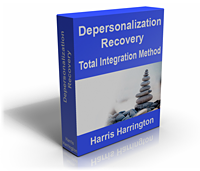Harris Harrington discusses the most common medications used to treat depersonalization and derealization.
 Disclaimer: I am not a doctor, and this article is not medical advice.
Disclaimer: I am not a doctor, and this article is not medical advice.
Can medications cure depersonalization disorder? The short answer to that question is no, they can’t cure DP. Some medications do provide relief, but usually at the cost of many side effects, and potential withdrawal symptoms that are occasionally long lasting. If you decide to take a medication for depersonalization, then you must consult a psychiatrist.
In this article I am going to go over the most commonly used medications for DP.
Benzodiazepines
The most fast acting class of medications that are commonly used to treat symptoms of DP (and in particular anxiety and panic) are benzodiazepines. You may have heard of Valium, Xanax, Ativan, Klonopin. They are all benzos.
Benzos cause you to relax very quickly. They are chemically similar to alcohol in that they increase activation of GABA in the brain, which is a chemical that makes you calm.
The problem is that Benzos can become addictive, and have serious withdrawal symptoms. If you take them every day for months, then you have to up the dose to get the same effect as before.
If you try to withdraw, then your DP and anxiety might increase.
Klonopin (also known as clonazepam) is slower acting and lasts longer than Ativan (Lorazepam).
Benzos are ideally taken on an “as needed” basis, and are more effective in people with DP who are highly anxious.
SSRIs
Selective serotonin reuptake inhibitor are a modern class of anti-depressants. They tend to be less effective than older anti-depressants, but they tend to have fewer side effects (though in reality side effects are very common with SSRIs as well).
Initially it was thought that SSRIs worked by inhibiting the reuptake of serotonin, therby keeping more serotonin free in the brain. Serotonin is a chemical involved in a sense of well being and feeling good.
But now that doesn’t seem to be the case, and the theory is that SSRIs somehow increase neuroplasticity.
There isn’t much evidence to support the use of SSRIs, and the efficacy rate is at about 60 percent for people with anxiety, which is pretty bad. Even then, there might just be a slight decrease in anxiety and we’re not sure how much of that is due to the placebo effect.
For depersonalization, SSRIs show themselves to be even less effective, though many psychiatrists still prescribe them.
Tricyclic Anti-depressants
TCAs have been around for decades and have more serious side effects than SSRIs. The only one worth mentioning for DP is called Anafranil (also known as clomipramine).
This medication is used often used to reduce obsessiveness, and is even prescribed to people with OCD or body focused repetitive behaviors such as compulsive hair pulling (trichotillomania).
Compared to SSRIs, anafranil has a higher percentage chance of working. But taking it is still a risk given the increased chance of more severe side effects.
Other medications
Many other medications are being studied for the treament of DP, but nothing has proven to be a cure. I doubt that there will be a cure in pill form, though if a clinically proven treatment does arise I would certainly be open to it.
DP is obviously caused by trauma, and treating that solely with a pill is probably never going to happen.
Medications are over prescribed, and usually not necessary
Psychiatrists tend to over prescribed medications. It’s a simple fact, and one only has to look at the monetary incentives to see why. The pharmaceutical industry is a multi-trillion dollar business. Many companies fund their own tests, which even further skews the “science” in their direction, but even then most medications for anxiety, DP, and depression are rather weak.
